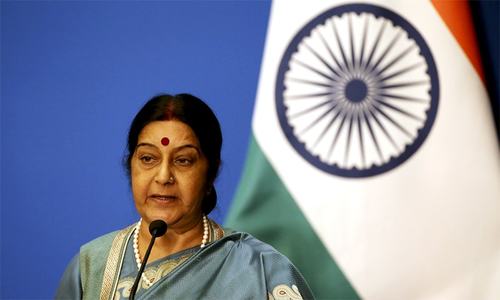Defence minister rules out immediate execution of Indian spy
ISLAMABAD: Defence Minister Khawaja Mohammad Asif has ruled out immediate execution of a convicted Indian spy and said three appellate forums are available to Kulbhushan Jadhav under the law.
He said that the trial of the Indian Navy officer — who was working for India’s Research and Analysis Wing (RAW) and was arrested in March last year — lasted three-and-a-half months. The charges he faced included spying for India, working against Pakistan’s integrity, sponsoring terrorism in the country and attempting to destabilise the state.
Speaking in the Senate on Tuesday, Mr Asif claimed that Jadhav had the right to move the army’s court of appeal against his conviction within 60 days, followed by submission of mercy pleas to the army chief and the president.
However, a perusal of the Army Act, 1952 showed that under Section 131 of the act, an appeal could be moved within 40 days, and not 60 days.
Rejecting the Indian claims that Jadhav’s execution would be “pre-meditated murder”, Mr Asif said that due process of law had been followed in the case.
The minister made it clear that elements involved in terrorist activities and those conspiring against the security and integrity of Pakistan would be allowed no concession, whether they lived in the country or came from across the border.
Says Gen Raheel has not yet applied for a no-objection certificate to work abroad
Pakistan’s high commissioner in New Delhi had already responded to India’s reaction over Jadhav’s conviction, he said. The government, the armed forces and the people have all resolved to defend the motherland.
He said that 200,000 troops had been deployed to the country’s western border and 80,000 to the Line of Control.
The minister said that no other country had suffered as much at the hands of terrorists as Pakistan, but added that its successes against the scourge of terrorism were also matchless.
Military alliance
The defence minister told the upper house of parliament that the much talked-about Saudi-led military alliance had not yet been established and that its terms of engagement and reference had yet to be given a final shape. A meeting of defence ministers of 41 proposed members of the alliance would be convened in Saudi Arabia in May where such matters would be finalised.
He said the government was committed to abiding by the parliament’s resolutions and declared that Pakistan was not going to become part of any alliance against Yemen. “We will become part of an alliance which is solely against terrorism,” he remarked.
Islamabad felt that Saudi Arabia had no intention of forming an alliance against any third country, Mr Asif said.
Pakistan, he said, would use its status as a nuclear-armed country for reconciliation among Muslim countries. Islamabad would be ready to play the role of a mediator, if needed.
Pakistan enjoyed brotherly relations with Saudi Arabia and its army was already in the country under an arrangement made in 1992, the minister said. The country’s air force and navy also had a presence in the kingdom.
About the appointment of former army chief retired General Raheel Sharif as head of the alliance, he said that under the rules a military officer had to seek a no-objection certificate (NOC) if he wished to serve abroad after retirement.
The previous PPP government, he said, had given an NOC to the former ISI chief retired General Ahmad Shuja Pasha to become adviser to the UAE government after his retirement.
He said General Sharif had yet to apply for an NOC. However, a letter had been received from the Saudi government about a month and a half ago in this connection, he said and added that “we have agreed in principle” over Gen Sharif’s appointment as chief of the alliance.
All concerns expressed by Iran in this regard would be removed, said the minister.
He referred to the recent visit of PM’s adviser on Foreign Affairs Sartaj Aziz to Iran and his meetings with the authorities there.
Mr Asif held the United States as responsible for creating divisions within the Muslim countries. “They support the ones who follow their agenda and those who resist become Qadhafi, Saddam and Bashar al-Assad.”
Senate Chairman Mian Raza Rabbani directed him to place before the house the contours of the military alliance and terms of engagement before their ratification by the cabinet.
Meanwhile, the parliamentary leader of the PPP in the house, Taj Haider, raised the issue of abduction of Asif Ali Zardari’s aides and the opposition staged a walkout in protest after Minister of State for Interior Baleeghur Rehman expressed his ignorance about details of the cases.
Published in Dawn, April 12th, 2017














































